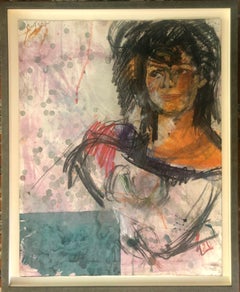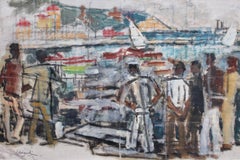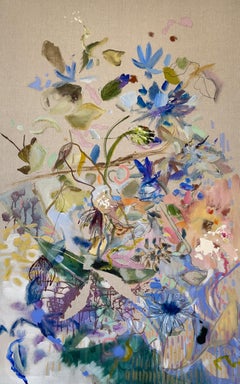Alexander Rutsch Mixed Media
Alexander Rutsch was born in Russia in 1916 but raised in Belgrade, Yugoslavia. After studying voice in Austria, he became an opera singer like his parents, but after the Second World War, Rutsch's love for visual expression propelled him to change careers. He was a painter, sculptor, philosopher, musician, singer and poet. His life as a romantic is reflected in his work, as he sought to perfect his soul and humanity, "I paint my dreams," said Rutsch. "My dreams are color and life. They soar in my head like millions of symphonies. I can never stop building dreams,” he said. In 1952, after studying under Josef Dobrowsky, Josef Hoffmann and Herbert Boeckl at the Academy of Fine Arts Vienna, Rutsch received a scholarship to study in France. There, he made contacts and began collaborations with his contemporaries, Picasso and Dali. Rutsch said of his experiences with Picasso, "Picasso played a short but important moment in my life in Paris that affected my entire artistic future. I learned from him that it is not important if art is not aesthetically finished. It can be raw, uncooked, rough. If an artist feels he has said it — it is not important to polish or finish it. Because of Picasso, I learned that if I don't feel the need to finish — I don't have to." In 1954, he exhibited his work at the Salon Artistique International de Saceux and won first prize for abstract painting, the first of many awards received during his prolific career. During the 13 years he lived in Paris, Rutsch exhibited in many prominent galleries there and throughout Europe. In 1957, the City of Paris awarded him the prestigious Arts, Science and Letters Silver Medal. In 1968, Rutsch moved to Pelham, New York where he continued to work in his studio and exhibit in galleries and museums worldwide. Rutsch's work, as seen through his mastery of many art forms — sculpture, painting, print-making, and drawing, and a wide variety of other media has been described as "vibrating showers of lines, bold geometries, wounded anatomically rambling scrap-wood skeletons, enigmatic totem figures, and congregations of fetishized, domesticated, and recycled rubbish heaps that conspire to a fantasy of Expressionism, Cubism, Dada, Fauvism, Cobra, and Primitivism." His pieces, as described by Emily Genauer, import silence and the monumentality of primitive statuary. His sculptures are stylized to abstract construction made of found objects welded and reshaped into bronze figures and animals of uncommon wit, airy, with grace and individuality. His portraits are crisp, intense, spare linear characterizations. Rutsch's creations suggest empathy. Rutsch passed away in 1997.
1980s Expressionist Alexander Rutsch Mixed Media
Charcoal, Oil Pastel, Watercolor
1950s Expressionist Alexander Rutsch Mixed Media
Paper, Pastel, Oil, Gouache
2010s Alexander Rutsch Mixed Media
Charcoal, Oil Pastel, Raw Linen, Acrylic
21st Century and Contemporary Abstract Alexander Rutsch Mixed Media
Canvas, Charcoal, Oil Pastel, Mixed Media, Acrylic
2010s Alexander Rutsch Mixed Media
Charcoal, Oil Pastel, Raw Linen, Acrylic
2010s Alexander Rutsch Mixed Media
Charcoal, Raw Linen, Acrylic, Oil Pastel
21st Century and Contemporary Abstract Alexander Rutsch Mixed Media
Canvas, Charcoal, Oil Pastel, Mixed Media, Acrylic
2010s Alexander Rutsch Mixed Media
Charcoal, Oil Pastel, Raw Linen, Acrylic
2010s Alexander Rutsch Mixed Media
Charcoal, Oil Pastel, Raw Linen, Acrylic
21st Century and Contemporary Abstract Alexander Rutsch Mixed Media
Canvas, Charcoal, Oil Pastel, Mixed Media, Acrylic
2010s Alexander Rutsch Mixed Media
Charcoal, Oil Pastel, Raw Linen, Acrylic
2010s Alexander Rutsch Mixed Media
Charcoal, Oil Pastel, Raw Linen, Acrylic
2010s Expressionist Alexander Rutsch Mixed Media
Paper, Oil Pastel, Ink, Oil


